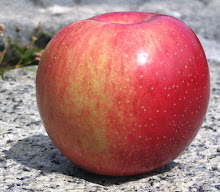Gold Rush originated at the Purdue Horticulture Research Farm in West Lafayette, Indiana, where it was named "GoldRush" in honor of (1) its color, (2) a purported "rush" of flavor, and (3) some goofy marketing theory that says if you jam two words together and capitalize letters in the middle, more people will buy the apple.

|
Sorry guys, but nobody calls it that, and it is a tribute to the actual qualities of this variety, not your marketing acumen, that people like it enough to reinterpret the name back into English.
Gold Rush is a medium-sized ribbed apple with waxy yellow skin (tinged with green) flecked with dark lenticels. A light bronze blush shows where the sun has been.
The flesh is yellow, firm, and crisp, still on the coarse side but more fine-grained than that of many yellow apples. Its flavor has the honeyed sweetness of a Golden Delicious, wedded to a pleasing tartness with a touch of acidity.
The tension between these flavors is just right and there are fleeting hints
of pear, citrus, and spice to keep things interesting.
Plus a little metallic fizz on the tip of the tongue.
This apple was really fun to eat and worth seeking out. It is reputed to be a good keeper, too.
 More than you ever thought there was to know about this apple is set forth in a
1994 paper published in Horticultural Science (HortScience 29(7):827-828) and
available online.
More than you ever thought there was to know about this apple is set forth in a
1994 paper published in Horticultural Science (HortScience 29(7):827-828) and
available online.
The authors provide a family tree for Gold Rush that goes back six generations and includes such apple luminaries as Winesap, Melrose, and of course Golden Delicious.
There's also a soberly quantitative comparison of Gold Rush versus Golden Delicious along such dimensions as firmness, "Titratable acidity," and pH.
Update: This is not a good keeper. It is a fabulous keeper.

We grow and sell hundreds of bushels of Goldrush every year directly to consumers who proudly show us samples of Goldrush they picked at our orchard the year before. You can write in cement: when grown right (well thinned and picked 180 days after full bloom) they are yellow as gold, sweet as sugar, intensely sour, keep like rocks and a favorite of the few fortunate enough to know them.
ReplyDelete@Anonymous above, please feel free to post a link to your orchard's web page, if any, or email me and I will.
ReplyDeleteI did not realize Gold Rush was such a good keeper. Staying good for a year, absent controlled atmosphere, is remarkable!
We buy Gold Rush apples from North Star Orchards in PA. I can vouch for their wonderful storage properties, although I haven't kept them for as long as a year. We fill our basement refrigerator at the end of the season, and they're still perfect when we finish them off in February (I would buy more, but have to give over half the space to Asian pears.) Everyone who tastes one asks where we got them. They are mostly solidly yellowish-gold-green, without the heavy pink tones in your picture.
ReplyDeleteI have some Goldrush growing in my hobby orchard in VA and can vouch for the wonderful qualities of this apple. Another quality I noticed this year is due to it's rock hardness until fully ripe, it's impervious to the dreaded brown marmorated stink bug, a major newer pest in the mid-Atlantic.
ReplyDeleteSadly these were not available around here this year, nor another flavorful keeper, Blushing Golden.
DeleteI'm surprised that no other posts have appeared since Jan. of 2013 for Goldrush. It has become my favorite eating apple by a good margin. The complexity of it's flavors are what sets it apart from many other apples. It's sweet, tart, spicy, and acidic with a touch of cider-y "tang". I've had other people try it and the response is usually - "WOW. That's a really good apple. What kind is it?" I have 3 growing in northern Pa. and they are KILLER right off the tree. Ours don't get as blushed as your pic, but more of a greenish-yellow with a slight area of blush on the sunny side. Spectacular apple in my book!!!
DeleteHi Mark,
DeleteI have published many posts about this remarkable apple since 2013, many in the past year.
To see them all on the Gold Rush page, click the Gold Rush label at the end of the post (above).
A similar organization exists for all the varieties and topics on this blog.
Well, I think Gold Rush is a superior apple either by way of eating, cooking,or storage. Today is Jan. 8, 2020 and I just picked one right off the tree in my backyard here in Portland, Oregon. It was delicious, firm and just as juicy as normal. It is also, obviously, a superior keeper. Birds and squirrels love them too. This hardy apple beats Cosmic Crisp hands down. But it's just not red.
ReplyDeleteI have a bag stashed away to eat in April.
DeleteSave some til then, you will not be sorry.
I've just had my first Gold Rush apples this autumn, and they're some of my favorites. But I'm a little perplexed, as my specimens have a rough skin with touches of russet. Is that a common variation, or are my apples golden russets mislabeled?
ReplyDelete@Anony, I can't say for sure. I have never seen russeted GRs, though it might be possible depending on growing conditions.
DeleteI'd ask, how does it match the flavor profile? Is it a great keeper?
I commonly find russeted Gold Rush apples when I am out picking them. In fact I tend to look for them, as I like russeted apples. It doesn’t seem to matter whether they are russeted, large, small or whatever. If I am able to gather them myself (which the local orchard didn’t allow during COVID), then they are great keepers. If someone else gathers them, they generally don’t keep as well. I have kept them through May some years. The only keeper I like better is Ashmead’s Kernel.
DeleteWell, Ashmead's is practically in a class by itself.
DeleteJe fais de mon mieux!
ReplyDeleteI wasted my money buying Goldrush at a produce stand. Hard sour apples despite being yellow.
ReplyDeleteThey are generally best when kept until April.
DeleteWestern WI: Those were picked way too early. I get mine as late as possible (the last weekend in October) and they're still tart at that time. It takes about 1 -- 2 months (Late November/December) before their taste begins to round out.
Delete